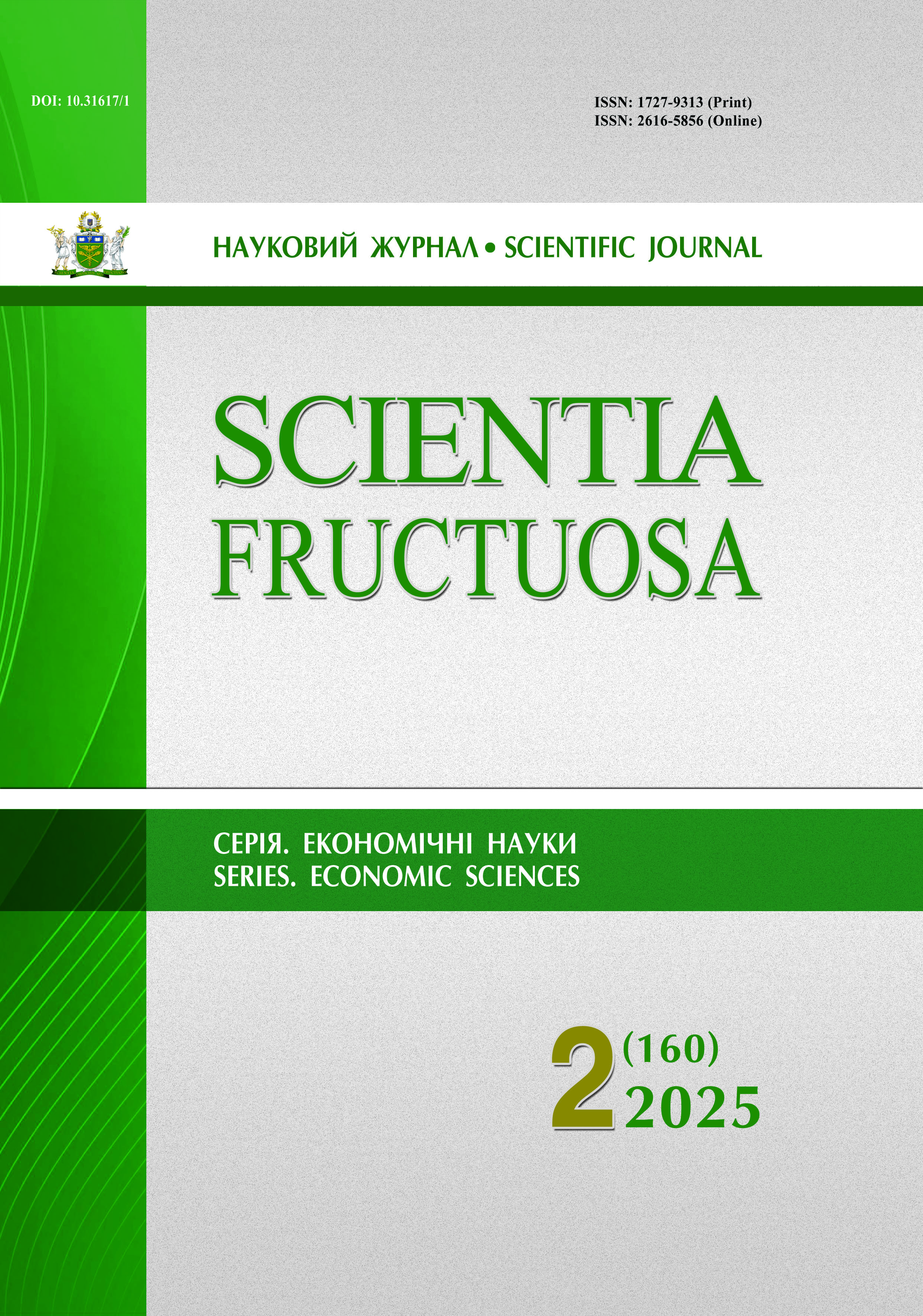Облікова ідентифікація та оцінка фінансових інструментів
DOI:
https://doi.org/10.31617/1.2025(160)06Ключові слова:
фінансові інструменти, облік, оцінка, бізнес-модель, нестабільність, ризики, подальша оцінка, справедлива вартістьАнотація
В умовах глобалізації фінансових ринків і зростання впливу економічної нестабільності розроблення ефективних моделей облікової ідентифікації та оцінки фінансових інструментів є надзвичайно актуальним. Це забезпечує суб’єктам господарювання стабільність і прозорість у фінансовій звітності, сприяючи підвищенню довіри інвесторів. Метою статті є визначення специфіки облікової ідентифікації та оцінки фінансових інструментів у сучасних умовах глобалізації та високої нестабільності, а також обґрунтування шляхів їх удосконалення з урахуванням змін у міжнародних і національних стандартах для забезпечення прозорості та ефективного управління фінансовими ризиками. Дослідження ґрунтується на гіпотезі, що сучасні зміни у стандартах обліку та оцінки фінансових інструментів впливають на рівень прозорості фінансової звітності та ефективність управління фінансовими ризиками, водночас адаптація обліку фінансових інструментів до міжнародних вимог сприятиме їх об’єктивнішому відображенню у фінансовій звітності підприємств. Застосовано методи системного та порівняльного аналізу, класифікації, логічного узагальнення. Висвітлено теоретичні засади облікової ідентифікації та оцінки фінансових інструментів, зокрема сутність різних бізнес-моделей та управління ними. Проведено аналіз наявних підходів щодо оцінки фінансових інструментів, включаючи первісну та подальшу оцінку, зокрема методи визначення справедливої вартості, та розглянуто проблеми, що виникають у процесі оцінки в умовах нестабільності. Обґрунтовано перспективи вдосконалення обліку фінансових інструментів в Україні, включаючи їх адаптацію до міжнародних стандартів, автоматизацію процесів обліку та формування рекомендацій щодо управління фінансовими ризиками в умовах сучасних викликів
Посилання
Baur, David (2023, January 9). IFRS: December 2022 year-end accounting reminders. https://www.pwc.ch/en/insights/accounting/ifrs-december-2022-year-end-accounting-reminders.html
Burdenko, I. M. (2006). Financial instruments: features of their classification. Actual Problems of Economics, (4), 24-31.
IAS 32. (2012). International Accounting Standard 32. Financial Instruments: Presentation. Official website of the Verkhovna Rada of Ukraine. https://zakon.rada.gov.ua/laws/show/929_029#Text
IASB. (2024). IASB issues narrow-scope amendments to classification and measurement requirements for financial instruments. The International Accounting Standards Board (IASB). https://www.ifrs.org/news-and-events/news/2024/05/iasb-issues-amendments-cmfi-ifrs7-ifrs9/
IASB. (2023). IASB publishes proposed amendments regarding financial instruments with characteristics of equity. The International Accounting Standards Board. https://www.iasplus.com/en-ca/news/part-i-ifrs/november-2023/iasb-publishes-proposed-amendments-regarding-financial-instruments-with-characteristics-of-equity
IFRS 9. (2012). International Financial Reporting Standard 9. Financial Instruments. No. 929_016 dated 01.01.2012, as amended. Official website of the Verkhovna Rada of Ukraine. https://zakon.rada.gov.ua/laws/show/929_016#Text
KPMG - Ukraine. (2022). Accounting and financial reporting during wartime. Klynveld Peat Marwick Goerdeler (KPMG) Ukraine. https://kpmg.com/ua/uk/home/media/press-releases/2022/05/oblik-ta-finansova-zvitnist-pidpryyemstv-pid-chas-viyny.html
KPMG. (2024). Q2 2024 new IFRS® Accounting Standards and amendments: Are you ready? Klynveld Peat Marwick Goerdeler. https://kpmg.com/us/en/articles/2024/ifrs-accounting-standards-amendments.html
Lohvinov, P. V. (2024). Financial instruments and their role in cross-border cooperation. Efficient economy, (7). http://nbuv.gov.ua/UJRN/efek_2024_7_52
Nahorna, Yu. (2022). IFRS 9 Review. National Bank of Ukraine. https://bank.gov.ua/admin_uploads/article/MSFZ_9_Review_pr_2022-09-06.pdf?v=5
NAR(S) 13. (2001). National Accounting Regu-lation (Standard) 13 "Financial Instruments". Official website of the Verkhovna Rada of Ukraine. https://zakon.rada.gov.ua/laws/show/z1050-01#Text
Nazarova, K., & Zadniprovskyi, O. (2018). Audit of valuation of financial instruments. Bulletin of the Kyiv National University of Trade and Economics, (4), 85-97.
Popko, Ye., & Lukova, O. (2023). Methodological component of improving the assessment of long-term debt as a financial instrument. Accounting & Finance, (3), 12-20. https://doi.org/10.33146/2307-9878-2023-3(101)-12-20 https://doi.org/10.33146/2307-9878-2023-3(101)-12-20 DOI: https://doi.org/10.33146/2307-9878-2023-3(101)-12-20
Pylypenko, L. M., & Demska, Yu. V. (2020). The impact of accounting policy for financial assets on the financial and property status and performance of companies. Pryazovskyi economic herald, 1(18), 300-304. https://doi.org/10.32840/2522-4263/2020-1-52 DOI: https://doi.org/10.32840/2522-4263/2020-1-52
Rapa, N. (2023). Financial instruments and features of their evaluation. International Scientific and Practical Conference "Development of Socio-Economic Systems in Geoeconomic Space", 102-103.
Shepeliuk, V. A., & Yunatskyi, M. O. (2019). Discoun¬ting as a financial instrument for the valuation of accounting objects: implementation problems under IFRS. Scientific Notes of the University "KROK" (Economic Sciences), (2), 80-84. https://doi.org/10.31732/2663-2209-2019-53-80-84 DOI: https://doi.org/10.31732/2663-2209-2019-53-80-84
Snihurska, L. P. (2017). Valuation of assets for the purpose of forming provisions for impairment under IFRS 9 "Financial Instruments". Efficient economy, (7). http://nbuv.gov.ua/UJRN/efek_2017_7_20
Yatsun, A., & Vdovenko, N. (2024). Financial instruments of sustainable development in the aspect of modeling the agricultural sector of the economy of Ukraine. Acta Academiae Beregsasiensis. Eco¬no-mics, (5), 230-245. https://doi.org/10.58423/2786-6742/2024-5-230-245 DOI: https://doi.org/10.58423/2786-6742/2024-5-230-245
##submission.downloads##
Опубліковано
Як цитувати
Номер
Розділ
Ліцензія

Ця робота ліцензується відповідно до Creative Commons Attribution 4.0 International License.
Ліцензія Creative Commons Зазначення Авторства 4.0 Міжнародна (CC BY 4.0)







